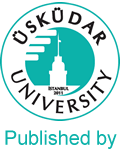ARTICLES
Original Article
Turkish Title : Examining the Relationship between the Knowledge of Sexually Transmitted Diseases and Sexual Myths among University Students in Turkey
Balkanoglu Cuneyt,Erensoy Habib,Donmezler Suleyman,Berkol Tonguc Demir
JNBS, 2021, 8(1), p:54-61
Objective: The purpose of this study is to evaluate the level of knowledge among university students on sexually transmitted diseases (STDs) and to compare the level of knowledge of this sample on STDs and their sexual myths. Methods: The sociodemographic data of 200 university students studying at several universities in Turkey randomly selected between January and March 2019 were evaluated with the “Sociodemographic Questionnaire,” their knowledge of STDs with the Sexually Transmitted Diseases Knowledge Questionnaire (STDKQ), and their beliefs in sexual myths with the Sexual Myths Scale (SMS). Results: There was no difference between the STDKQ and the SMS in terms of demographic variables. However, differentiation was seen between the “sexual behavior,” which is one of the subscales of sexual myths, and STDs. The STDKQ scores revealed that individuals who were previously informed received higher scores than those who did not. The level of knowledge about STDs was higher in men than in women. Conclusion: The knowledge of STDs among university students and their beliefs in sexual myths were evaluated based on sociodemographic variables. According to the results, we obtained from our research to increase the level of knowledge about STDs, and for the healthy development of sexual behavior, formal education including sexual health issues should be provided, research should be done for each region in Turkey on this subject, and in line with the results, necessary information should be provided regarding sexual health.
Objective: The purpose of this study is to evaluate the level of knowledge among university students on sexually transmitted diseases (STDs) and to compare the level of knowledge of this sample on STDs and their sexual myths. Methods: The sociodemographic data of 200 university students studying at several universities in Turkey randomly selected between January and March 2019 were evaluated with the “Sociodemographic Questionnaire,” their knowledge of STDs with the Sexually Transmitted Diseases Knowledge Questionnaire (STDKQ), and their beliefs in sexual myths with the Sexual Myths Scale (SMS). Results: There was no difference between the STDKQ and the SMS in terms of demographic variables. However, differentiation was seen between the “sexual behavior,” which is one of the subscales of sexual myths, and STDs. The STDKQ scores revealed that individuals who were previously informed received higher scores than those who did not. The level of knowledge about STDs was higher in men than in women. Conclusion: The knowledge of STDs among university students and their beliefs in sexual myths were evaluated based on sociodemographic variables. According to the results, we obtained from our research to increase the level of knowledge about STDs, and for the healthy development of sexual behavior, formal education including sexual health issues should be provided, research should be done for each region in Turkey on this subject, and in line with the results, necessary information should be provided regarding sexual health.
| ISSN (Print) | 2149-1909 |
| ISSN (Online) | 2148-4325 |
2020 Ağustos ayından itibaren yalnızca İngilizce yayın kabul edilmektedir.


